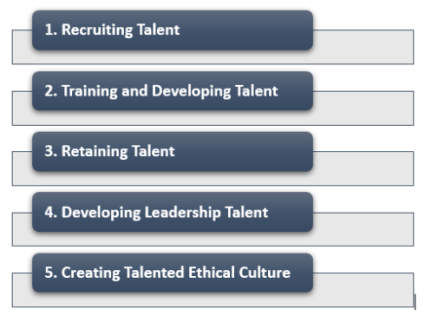Current Trends in Talent Management
April 3, 2025
 Current Trends in Talent Management
Current Trends in Talent Management
If you ask me for the guidelines for talent management, my response would be the following: Developing employees. Redeploying employees. Retaining the best talent. Yes, the prime focus of talent management is enabling and developing people, since the quality of an organization is determined by the people it employs and has onboard. After hiring and…
 Achieving Competitive Advantage through Talent Management
Achieving Competitive Advantage through Talent Management
Organizations work towards the achievement of their mission and strategic objectives. This requires a thorough understanding of the resources required for achieving the same. Resources here imply financial and non financial both and they are equally important and interdependent. Technically these resources have been divided into two, non contingent and differentiating capabilities. Whereas non contingent…
 Application of Talent Management in Current Economic Condition
Application of Talent Management in Current Economic Condition
The current economic conditions demand a cut in the expenses. Unfortunately enough for talent management though organizations and leadership is all praise for it on papers, the same is neglected as seen as a cost center when it comes to implementation. In wake of the economic recession human resource professionals are under huge pressure to…
There is no dearth of professionals but there is an acute shortage of talented professionals globally.
Every year B-schools globally churn out management professionals in huge numbers but how many of are actually employable remains questionable! This is true for other professions also.
The scenario is worse even in developing economies of south East Asia. Countries like U.S and many European countries have their own set of problems. The problem is of aging populations resulting in talent gaps at the top.
The developing countries of south East Asia are a young population but quality of education system as a whole breeds a lot of talent problems. They possess plenty of laborers - skilled and unskilled and a huge man force of educated unemployable professionals. These are the opportunities and challenges that the talent management in organizations has to face today - dealing with demographic talent problems.
Now if we discuss the problem in the global context, it’s the demographics that needs to be taken care of primarily and when we discuss the same in a local context the problem becomes a bit simpler and easier to tackle. Nonetheless global or local at the grass roots level talent management has to address similar concerns more or less. It faces the following opportunities and challenges:

The recent economic downturn saw job cuts globally. Those who were most important to organizations in their understanding were retained, other were sacked. Similarly huge shuffles happened at the top leadership positions. They were seen as crisis managers unlike those who were deemed responsible for throwing organizations into troubled waters. It is the jurisdiction of talent management to get such people on onboard, who are enterprising but ensure that an organization does not suffer for the same.
The downturn also opened the eyes of organizations to newer models of employment - part time or temporary workers. This is a new challenge to talent management, training and developing people who work on a contractual or project basis. What’s more big a challenge is increasing the stake of these people in their work.
While organizations focus on reducing employee overheads and sacking those who are unessential in the shorter run, it also spreads a wave of de motivation among those who are retained. An uncertainty about the firing axe looms in their mind. It is essential to maintain a psychological contract with employees those who have been fired as well as those who have been retained. Investing on people development in crisis is the best thing an organization can do to retain its top talent.
Leadership in action means an ability to take out of crisis situation, extract certainty out of uncertainty, set goals and driving change to ensure that the momentum is not lost. Identifying people from within the organization who should be invested upon is a critical talent management challenge.
Setting standards for ethical behavior, increasing transparency, reducing complexities and developing a culture of reward and appreciation are still more challenges and opportunities for talent management.
(Since an opportunity is the other face of challenge and vice versa, the words challenge and opportunity have been used interchangeably in the article)
Your email address will not be published. Required fields are marked *